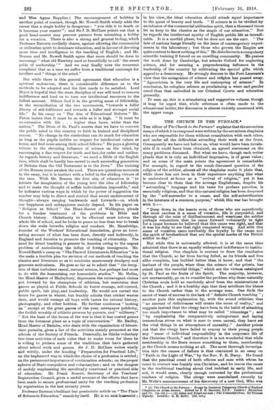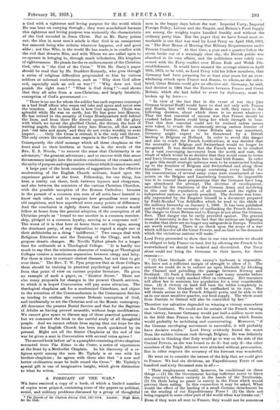TIM CHURCH IN THE _FURNACE.*
THE editor of The Church in the Furnaoel explains that the seventeen essays of which it is composed were written by the seventeen chaplains who are responsible for them without consultation with each other, and under all the difficulties attending their work at the front. Consequently we have not before us, what would have been invalu- able if it could have been obtained, an agreed statement on the many problems discussed. But what we have, though each writer pleads that it is only an individual impression, is of great value ; and on some of the main points the agreement is remarkable. For example, in regard to the much-discussed question of the religion of the soldier, almost all the chaplains make it plain that, while there has not been in their experience anything like what is understood at home as a " revival of religion," yet it has become clear to them that the average Englishman, despite his " astounding " language and his taste for profane parodies, is essentially religious, and that this natural religion has been deepened by the "self-surrender to a cause, and the self-subordination in the interests of a common purpose," which this war has brought with it t- " Deep down in the hearts even of those who are superficially the most careless is a sense of vocation, life is purposeful, and through all the mist of disillusionment and weariness the soldier perhaps remembers that he came forward voluntarily to fight for a cause because he believed that this cause was right, and that it was his duty to see that right conquered wrong. And with this sense of vocation came inevitably the loyalty to the cause and the spirit of brotherhood that are the special marks of the British soldier to-day."
But while this is universally allowed, it is at the same time admitted that there is an equally widespread indifference to institu- tional religion. One chaplain is content to draw the conclusion that the Church, so far from having failed, as its friends and foes alike complain, has builded better than it knew, and that " the instinct of the people, wiser than the science of the priests, has seized upon the essential things," which are the virtues catalogued by St. Paul as the fruits of the Spirit. The majority, however, not unreasonably, go on to consider the problem why these naturally Christian souls hold so resolutely aloof from the ministrations of the Church ; and it is a healthy sign that they attribute the blame to the Church rather than to the average man,. One finds the secret of want of success in the lack of " definite Church teaching " ; another puts this explanation by, with the sound criticism that " no amount of definiteness will create the sense of reality," and suggests instead that the clergy have been in the habit of attaching too much importance to what may be called " trimmings " ; and " by emphasising the comparatively unimportant and laying tremendous stress on what is sure to seem unreal, they have set the vital things in an atmosphere of unreality." Another point. out that the clergy have failed to convey to their young people any " sense of individual responsibility in the corporate life of the Christian Church," and therefore it is not wonderful that while membership in the State means something to them, membership in the Church means nothing at all. The most thorough investiga- tion into the causes of failure is that contained in an essay on " Faith in the Light of War," by the Rev. F. R. Barry. He found that the practical creed of both officers and men with whom he ovine in contact was frankly non-Christian, and he traces the cause to the traditional teaching about God imbibed in early life, and not, it would seem, clearly enough corrected by the professional teachers of religion. The clergy were scandalized recently by Mr. Wells's announcement of his discovery of a new God, Who was • (1) The Church in the Furnace : Essays by Seventeen Tonporary Church of England Chaplains on Active Service. Edited by F. 11..Macnutt, 9.a F. London t Macmillan and Co, 15e. net.)—(2) Lilies and Foryet-me-note: The Untouched Cross. By Thomas Tiplady. London t 11. H. Kelly. Ind. net.]
a God with a righteous and loving purpose for the world which He was bent on carrying through ; they were scandalized because, -this righteous and loving purpose was eminently the characteristic of the God revealed in Jesus Christ. But as Mr. Barry points out, the idea in most men's minds is that God is an omnipotent but unmoral being who ordains whatever happens, evil and good alike ; not One Who, in the world He has made, is in conflict with the evil that thwarts Him, and with Whom we are called upon to co-operate in bringing in, through much tribulation, His kingdom of righteousness. He pleads for the re-enthronement of the Christian God, who is " the God of the Cross." With Mr. Barry's paper should be read that by Mr. Studdert-Kennedy, who goes through a series of religious difficulties propounded to him by various soldiers at informal conferences, such as " Why does God allow evil, especially such an evil as war ? " " Why does not God punish the right man ? " " What is God doing ? "—and shows that they all arise from a non-Christian, and largely fatalistic, conception of God's government :-
" There is no one for whom the soldier has such supreme contempt as a bad Staff officer who wears red tabs and spurs and never sees the trenches. And to him that is how God appears. Christ was splendid while He was on earth, but He has gone into Heaven. He has retired to the security of Corps Headquarters well behind the lines, and from there He directs operations. All the glory with which we invest the glorified Christ, the throne, the host of waiting angels, the triumphal entry into Heaven, all this means just red tabs and spurs,' and they do not evoke worship or even respect. . . . Only the dross is eternal, it is the only real throne. The only crown the modern man respects is the Crown of Thorns." Consequently the chief message which all these chaplains at the front send to their brethren at home is, in the words of the Rev. E. S. Woods, " to recover the sense that Christianity is an adventure," the greatest adventure ; and to recover with that sense the necessary insight into the modern conditions of the crusade, and the unity of purpose and organization without which it cannot succeed.
A large part of the book consists of suggestions for the effective modernizing of the English Church militant, based upon the experience gained at the front. Fellowship, for one thing, has been a reality out there, both between laymen and clergymen, and also between the ministers of the various Christian Churches, with the possible exception of the Roman Catholics ; because in the pursuit of a common aim men of all sorts have learned to know each other, and to recognize how groundless were many old suspicions, and how superficial were many points of difference. And the conclusion is rightly drawn that similar results would follow at home from the general adoption of the conception of all Christian people as " bound to one another in a common member- ship, pledged to a common loyalty, moving to a corporate end." The worst of it is that here at home there are few signs, among the dominant party, of any disposition to regard a single one of their shibboleths as a thing " indifferent." Two essays deal with Religious Education and the Training of the Clergy, and both propose drastic changes. Mr. Neville Talbot pleads for a longer time for ordinands at a Theological College. " It is hardly too much to say that the minimum character of training at Theological Colleges creates a maximum separation between clergy and laity. For there is time to contract clerical diseases, but not time to get over them." The Rev. T. W. Pym proposes that at these Colleges there should be training in practical psychology and papers set from that point of view on current popular literature. He gives an example of such a paper, on " Sinister Street." There are also many proposals for changes in the present Church services, to which it is hoped Convocation will pay some attention. The theological chaplains ask for a modernized Catechism, and object to the retention of the Commandments in the Communion Service as tending to confirm the current Hebraic conception of God, and incidentally to set the Christian seal on the Mosaic cosmogony. All denounce the present Burial Service and that for the Baptism of Adults as having proved unusable, without large modification. We cannot give space to discuss any of these practical questions ; but we commend the book to the careful study of all thoughtful people. And we cannot refrain from saying that our hope for the future of the English Church has been much quickened by its perusal. Might not all the Senior Chaplains at the end of the war be given a seat in Convocation with several votes apiece The second book before use is a pamphlet consisting of two chapters extracted from The Kitten in the Crater, a series of experiences at the front by a Methodist Chaplain. In his discovery of a re- ligious spirit among the men Mr. Tiplady is at one with his brother-chaplains ; he agrees with them also that " a new and better civilization must he built round the Cross." Mr. Tiplady's special gift is one of imaginative insight, which gives distinction to what he writes.



























 Previous page
Previous page